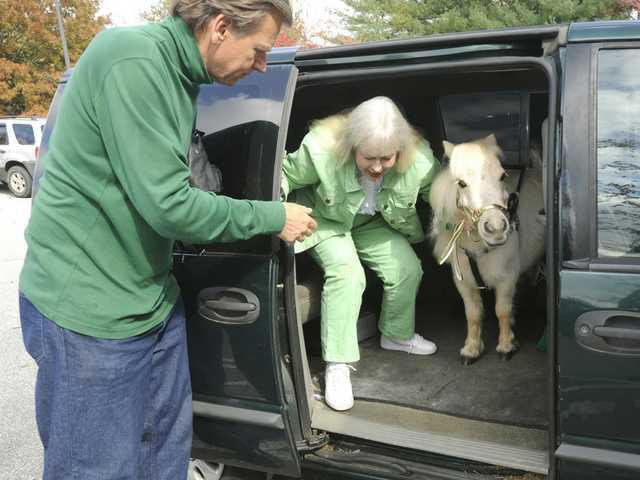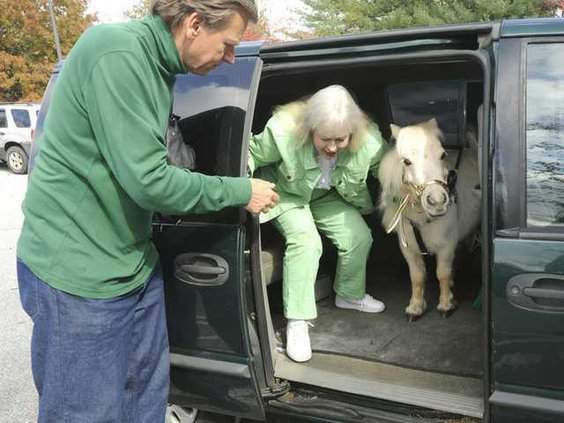Before Renata di Pietro heads out, she makes sure that her little one’s hair is combed and that she visits the potty before they leave the house. Though di Pietro’s companion follows quietly alongside her from store to store, more often than not they gather strange looks. At 28 inches tall, the tiny tot would look eye-to-eye with the average 2-year-old, but Angel isn’t your average toddler. She’s a miniature horse. And a guide for di Pietro, who is legally blind. "I’ve had her for three years," said di Pietro, who lives in Cleveland. "She’s not fully trained, but she’s learning. If I’m walking, she’ll let me lean on her to brace, or if I fall, she’ll let me throw my body on her." According to di Pietro, fewer than a dozen people in the United States use miniature horses as service animals. Most people tend to go with the more traditional guide dogs. "I had three dogs. They’re great. There’s nothing better than a dog," di Pietro said. "The sad thing about dogs is that the bigger they are, the shorter their lives. You only have a working life of about 6 to 10 years. Then the dog gets old and dies or you have to retire it. "That’s why I’ve had three. It’s not easy having to change your dog, that’s why I thought a horse would be better. Generally speaking, a horse like this lives to be 35." Since she has been dealing with failing vision for more than two decades, having a service animal with longevity is important. "I’ve been legally blind since I was 24. I always had visual problems, but then it got really out of hand. I have bad retinas," di Pietro said. "For the last five years, once the cataracts set in, I could hardly tell if it was day or night." After having the cataracts removed from her eyes, di Pietro regained some vision. She can see figures and some color, but she can’t judge depth. Even after the surgery, she remains legally blind. Angel helps her make the best of her precarious position between being fully blind and having sight. "When you have partial sight, you don’t belong in one world or the other. You don’t necessarily look blind. You see some things and you get called a fake," di Pietro said. Angel helps guide di Pietro navigate whenever they’re away from home. "Under Georgia law, you’re supposed to carry a cane or have a service animal with you to tell people you have a problem, so Angel certainly gets the attention of the cars," di Pietro said. "She stops at curbs and she’s learning to do more and more to tell me it’s not safe to go across the street yet. "Her work is so subtle that people don’t recognize when she’s stopping to show me something. I know because I know her body language. Just like she knows mine." If they are walking across a room and the flooring changes from carpet to tile, Angel will paw at the ground to let di Pietro know there’s a change in texture. Angel is also very well mannered. She doesn’t bite. She doesn’t kick and she’s practically house-broken. And if she hears you say, "kiss," she just might plant a wet one on you, a trick that she learned in just two weeks. "Miniatures are smart," di Pietro said. Angel is learning how to help di Pietro find a seat in crowded rooms and locate the door. She’s also learning a thing or two about self control. "In the store, when you have a dog, you have to worry about the meat section. You have to make sure they’re well-trained," di Pietro said. "A horse, of course, doesn’t care about the meat. "Angel goes after the plants and fruits. I have to watch her there. But she’s learning." Since Angel has been such a big assistance to her, di Pietro would like to start a service horse foundation with a friend, who is also visually impaired and uses a miniature horse as a guide. That’s not the only dream she has. Although a number of heart attacks and other health complications have left the classically trained opera singer too weak to perform, she hasn’t given up on her talents yet. "When you get as close to death as I have — I died once already — you look back at your life and say, ‘What I should’ve done. What I could’ve done,’" di Pietro said. "You also say, ‘What could I still do to make whatever’s left happy.’ I want to go around with my horse, my harp, my voice and my husband the violinist to hospitals and give back a little bit. "I can’t do a lot, but I can do a little." Although people tend to stare more when they see a horse instead of a dog guiding di Pietro around, she says there are advantages. Among other things, people are less afraid of Angel than they were of her dogs. "Over 25 years, I got ‘does he bite,’ a lot when I was out in public with my dog. None of my dogs had ever bitten anyone, but people are just afraid of large dogs," di Pietro said. "I don’t get that fear with Angel." To her disappointment, people’s unwarranted fear of her dogs caused them to be standoffish and less than friendly. With Angel, di Pietro says it’s just the opposite. "The bad part of that is everyone follows you around when you have a horse," di Pietro said with a laugh. "You become a parade of people." Instead of being shocked to see a miniature horse out shopping, folks could just be awestruck by Angel’s fashion sense. "I made her a gold halter. You can take (the bridge across her nose) off and put on a piece that has rhinestones on it," di Pietro said. "She als has a silver halter coming and I’m still making a few others. I gotta dress her up. If I accessorize, she’s got to." In addition to being patient during dress-up, di Pietro loves other things about Angel. "She’s nice and quiet and doesn’t bark like a dog," di Pietro said. "I also get to live out a bit of a childhood fantasy. This little girl has finally gotten her pony."
Cleveland womans seeing-eye horse is also her companion
Unusual service animal turns heads

